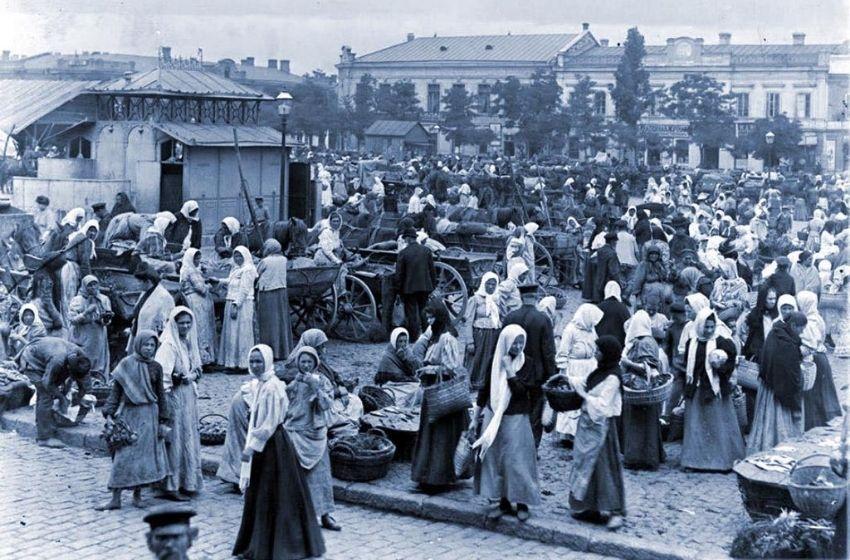The Odessa "Privoz" (market) is known all over the world. The year of birth of the famous open market is considered to be 1827, but for many Odessans Privoz appeared much earlier, in 1796, exactly two years after the founding of Odessa.
Initially, there were three markets in Odessa: Greek, Old and New. And Privoz was considered a part of the Old Market. On the site of the modern "Privoz", goods were traded from carts and trucks, that is, "from the wheels." Odessans called this place "Privoz". Over time, the name stuck and has survived to this day.
At first, the market took up very little space - benches and booths were installed on a small area. Those who asked for a rent of a shop for trade had to take part in the auction, which was arranged by the city government. Stone buildings were not specially built here, as they would interfere with the passage of horse-drawn vehicles that brought goods here. In addition, the stone shops of the Old Market were very close.
City authorities monitored prices for Privoz
In 1797, the city authorities signed a contract with the famous merchant Filippov, according to which he received the right to "repair the sale" and "have a difference" in the sale of meat products. However, at the same time, he was obliged to maintain the cost of the products, which was established by the city authorities, and the products themselves had to be of excellent quality.

Trade supervisors and elders kept order in the market. They were chosen from among merchants and bourgeoisie, they were called "bazaar". Their duties were regulated by a special instruction of the city administration. In addition to order, the observers also controlled prices, making sure that traders did not speculate and did not inflate the cost of vital products too much. Market watchers also monitored customs. In 1892, with the advent of the new City Statute, new positions were introduced. Among them were the ranks of the trade and economic police, whose candidacies were approved by the city government.
Merchants taxed "on cleanliness"
In terms of sanitary conditions, the old Privoz did not differ much from the modern one, and in some ways even surpassed it. As the correspondent of Odesskiy Vestnik wrote at that time, in the aisles between the pavilions, "those who passed and traded in the square met their natural needs," in the rows where they traded in greens and fruits, heaps of tops, leaves and spoiled berries were rotting.
The stench around the market was unbearable, and the city authorities were desperate to fight the unsanitary conditions. To do this, the traders were charged a "wheel tax" - the owner of each wagon that drove into the "Privoz" paid three kopecks a day. The tax was also taken from those who traded on trays. Later, all fees were cancelled, and the Odessa authorities took care of the cleanliness of the imported rows - funds for this began to be allocated from the city budget.
In 1902, in Odessa, a case of plague was recorded, with which the inhabitants of Odessa had to deal with it several times in previous years. It soon became clear that all the sick were related to "Privoz", where rats were abundant. Disinfection and cleaning had no effect, so the city authorities made a tough decision: to burn the dirtiest shops. A special commission estimated their value and paid compensation to the owners, and then the shops were burned to the ground. The merchants were temporarily transferred to the Kulikovo field.
They began to build up "Privoz" with stone buildings only before the First World War. In 1913, according to the project of the architect Fyodor Nesturkh, four two-storey buildings of the Fruit Passage were built. After the revolution, they tried to rename Privoz to Oktyabrsky Market, but the name did not catch on.

Odessa citizens searching for treasure of Privoz
"Privoz", like any decent sight of Odessa, has its own legends. One of them tells that in the 1920s a certain Yakov Pilerman became the director of Privoz. He had an amazing commercial flair; everything that the director undertook was sure to turn into money. It was a pity to donate money earned by one's own sweat and blood to the state. Therefore, Pilerman put them in his pocket with a clear conscience. In addition, Pilerman was connected "for work" with Misha Yaponchik, the famous Odessa king of thieves, whom he helped to sell stolen goods, and at the same time to collect tribute from sellers.
The fake reconstruction of Privoz was the latest scam of the director. Pilerman pocketed all the money allocated for this purpose by the State. Everything was revealed during the investigation. The director tried to escape, but he was caught at the border, convicted and shot. Before his execution, he allegedly confessed that he had buried most of his treasures somewhere on the Privoz.
Stubborn rumours began to circulate in Odessa that Pilerman's treasure was distinguished by fabulous wealth. It was said that it consisted either of gold bars packed in bags, or of precious stones in chests. They have been trying to find the treasures for more than a dozen years. Often, traders who came to the market in the morning found holes dug by someone. However, the enthusiasts never found the treasure, and now this story is considered one of the many Odessa legends.
The unusual elephant's snack in Privoz
In March 1941, a curious incident took place at Privoz, about which Odessa newspapers were happy to write. One of the inhabitants of the Odessa zoo, the elephant Murza, was going to be transported to a new habitat, to Simferopol. As soon as he was taken out into the street, the animal's sensitive "nose" smelled mouth-watering smells that wafted from the Fruit Passage. Without thinking twice, the elephant decided to have a snack.
He (the elephant) ate several apples with appetite, took pickles out of a barrel with his trunk. Then the elephant tasted several heads of fresh cabbage and ate some dried fruit.
From local press, March 1941
In the end, the animal was pacified and brought to the station. A popular Soviet comedy film, Striped Trip (1961), was inspired by this incident.




















